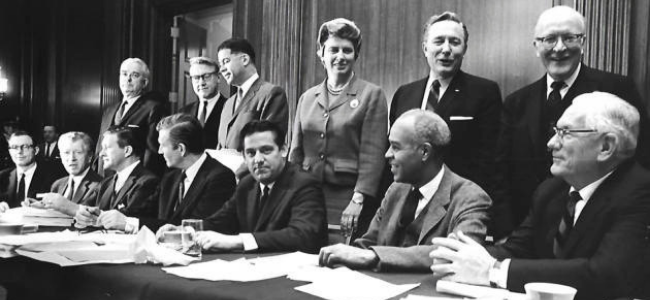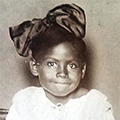Host, Joe Richman: From PRX’s Radiotopia, this is Radio Diaries. I’m Joe Richman. Today, books about racism have become bestsellers. Talking about race is what we do now. Whether it’s debating critical race theory or calling out white privilege. But over five decades ago, there was a book that talked about American racism in a new way. It sent shock waves throughout the country, and it came from a very unlikely source, a government commission. Radio Diaries Producer, Mycah Hazel has been working on this story and she picks it up from here.
Producer, Mycah Hazel: In the summer of 1967, dozens of American cities were rocked by protests against racial discrimination. Many White Americans were eager to put the blame on other things, snipers, militants, everything, but racism. That changed when 11 senators came together and released the Kerner Report, a deeply reported 1400-page explanation of the causes of the protest. It was an instant bestseller selling over half a million copies in just three weeks, getting shoutouts by celebrities like Marlon Brando, and sparking debates on news programs throughout the country. The book talked about white racism at a time when that phrase was mostly used by Black activists, not White politicians. Today’s story is part of our ongoing series, Last Witness. Fred Harris is a former U.S. Senator from Oklahoma and at 90 years old, he’s the only living member of the Kerner Commission.
Archival audio: 1100 national guardsmen have been rushed in to protect police, looters carry off thousands of dollars worth of goods with a gay sort of leisure.
Fred Harris: In the summer of 1967, the whole news was only burnings and reports about shootings, firing at people, and so forth. Every night, every day, all summer long, everywhere it seemed like.
Archival audio: This is one of the dozens of fires which raised through the night in Detroit. These firemen have been here half an hour and the flames are still licking toward this gasoline station.
Archival audio: This is going to happen all over America. It’s going to be a hot world, not a hot summer. It’s a hot world.
Fred Harris: People were frightened, puzzled, and scared, and mad. Looking for some kind of explanation. It wasn’t long after that, that we were in our living room and my youngest daughter who was then I think about in the second or third grade, Laura, came running out of the kitchen and she said, “Daddy, President Johnson is on the phone for you.” I said, “Well, is it the president or is it his secretary?” She said, “No. He said this is President Johnson. Let me talk to your daddy.” So I went into the kitchen and took the wall telephone standing at attention. “Uh, yes sir. Mr. President.” And he said, “Fred, I hope you’re going to watch television. I’m going to point that commission you’ve been talking about.” He said, “And another thing Fred, I want you to remember that you’re a Johnson man.” I said, “Yes, sir. I am a Johnson man.” He said, “If you forget it, I’m going to take my pocket knife and cut your blank off.” He did not say blank. (Fred chuckles)
Archival audio (President LBJ): My fellow Americans, we have endured a week such as no nation should live through. A time of violence and tragedy. I am tonight appointing a special advisory commission on civil disorders.
Fred Harris: Well, he said it this way. Answer three questions, what happened, why did it happen, and what can be done to prevent it from happening again?
Archival audio (President LBJ): Sometimes various administrations have set up commissions that were expected to put the stamp of approval on what the administration believes. This is not such a commission.
Fred Harris: Here’s the way the Kerner Commission got started. We sent teams out to every one of these riots cities like Detroit or Newark or Cincinnati, to actually talk to the people themselves. We were in suits and ties. White guys in suits, going out and walking around and just talking to ordinary people. I spent one morning in a Black barbershop in Milwaukee, the young people were coming in, young men were people who had themselves come from the South. Sort of to break the ice, the first question I was asking to start with was, do you see more discrimination here in Milwaukee? Or less, than you saw back home in Jackson? And it puzzled these young men, and I finally figured out why is in Milwaukee, they didn’t see any white people! There was more rigid segregation in Milwaukee than there was in those Southern cities where they had come from. Families were living in really terrible conditions, awful housing, no jobs, and almost criminally inferior schools. I think for all of us, all of us commissioners, traveling around the country like that, talking to actual people in the riot cities, that turned out to be a really searing experience.
Archival audio (Harry Reasoner): Good evening. This is Harry Reasoner.
Fred Harris: March 1, 1968, the Kerner Report was officially released. The president told us to tell the truth and that’s what we did.
Archival audio (Harry Reasoner): The president’s special commission on civil disorders has confronted the American people with a new shock to our national sense of wellbeing, a charge of White racism, national and scale terrible in its effects.
Fred Harris: Nobody had ever used the word. Certainly, nobody in the government ever used the word racism before. We thought that was important.
Archival audio (Harry Reasoner): More than 1400-pages of testimony, findings, conclusions. Our nation, says the report, is moving toward two separate societies, Black and White separate but unequal.
Fred Harris: Particularly for young Black people, we wanted to say to them, you’re not crazy! There is systemic racism in this country.
Archival audio (News broadcast): The president is well aware of what the report contains, but we have heard nothing from the White House yet.
Fred Harris: We set up a meeting with President Johnson, but then, we were notified that Johnson had canceled the meeting. He was shocked and dismayed by our report.
Archival audio (President LBJ): The Kerner Commission made a very exhaustive study and spent a couple of million dollars.
Fred Harris: (Johnson recorded his telephone conversations)
Archival audio (President LBJ): But they recommended that I spend 80 million and I got no place to get the 80. I can’t borrow it. I can’t tax it. I can’t get a tax bill of any kind.
Fred Harris: It really hurt his feelings. Here he had done more against poverty and against racism than any president in history before or since. The Civil Rights Act of 1964 and the voting rights act of ‘65. And people, like him, I think thought, well, God, I thought we solved all that.
Archival audio (President LBJ): Every time we appoint one of these committees, you get more than you can do anything about.
Fred Harris: We didn’t think we ought to limit what we said by what was practical. Who the hell knows what’s practical? I felt so strongly about what needed to be done and what massive change was needed, but we never were able to get across what the conditions that people were living in were to a big part of the country. They didn’t feel it in their stomach like we did. People like my dad, for example, he loved me of course, but the way my dad heard the commission report was this: Mr. Harris, out of the goodness of your heart, you ought to pay more taxes to help poor Black people who are rioting in Detroit. And my dad’s reaction was “The hell with that!” People don’t want to be called racist, but racism permeates everything about America. And we can’t really understand the way our law system works and so forth unless we talk about race. All these years later, 53 years later, if we’d just do now, what the Kerner Commission recommended we could change things.
Host, Joe Richman: Fred Harris; he served in the Senate for another five years until 1973. He went on to run for the Democratic presidential nomination twice in 1972 and 1976, and he retired from politics shortly after. Today, Fred Harris is the last surviving member of the Kerner Commission. You can find the original Kerner report in our show notes and on our website, radio diaries.org. Our story was produced by Mycah Hazel. Radio Diaries also includes Alissa Escarce, Stephanie Rodriguez, Nellie Gilles, and myself. Our editors are Deborah George and Ben Shapiro. Radio Diaries is part of the Radiotopia network from PRX, you can hear all the shows at radiotopia.fm. We have support from the National Endowment for the Humanities, National Endowment for the Arts, NYSCA, and from listeners like you. I’m Joe Richman. Thanks for listening (reading).








